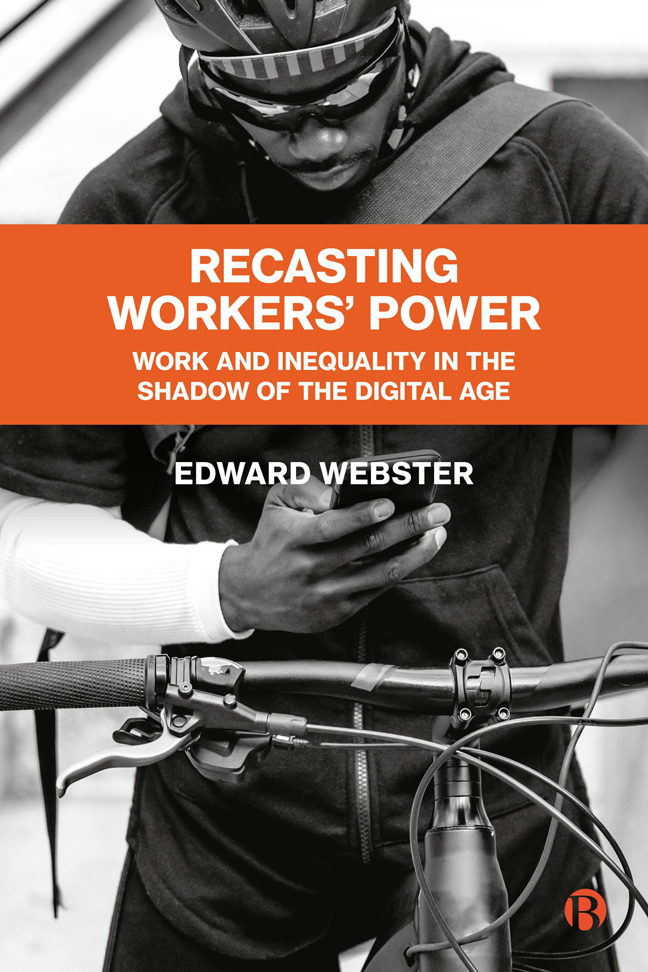Book contents
- Frontmatter
- Contents
- List of Figures and Tables
- List of Abbreviations
- Preface
- 1 The End of Labour? Rethinking the Labour Question in the Digital Age
- 2 Precarious Work after Apartheid: Experimenting with Alternative Forms of Representation in the Informal Sector
- 3 Neo-liberalism Comes to Johannesburg: Changing the Rules of the Game
- 4 Divided Workers, Divided Struggles: Entrenching Dualisation and the Struggle for Equalisation in South Africa's Manufacturing Sector
- 5 Authoritarian Algorithmic Management: The Double-edged Sword of the Gig Economies
- 6 Crossing the Divide: Informal Workers and Trade Unions
- 7 Global Capital, Global Labour: The Possibilities of Transnational Activism
- 8 Changing Sources of Power and the Future of Southern Labour
- Index
3 - Neo-liberalism Comes to Johannesburg: Changing the Rules of the Game
Published online by Cambridge University Press: 23 January 2024
- Frontmatter
- Contents
- List of Figures and Tables
- List of Abbreviations
- Preface
- 1 The End of Labour? Rethinking the Labour Question in the Digital Age
- 2 Precarious Work after Apartheid: Experimenting with Alternative Forms of Representation in the Informal Sector
- 3 Neo-liberalism Comes to Johannesburg: Changing the Rules of the Game
- 4 Divided Workers, Divided Struggles: Entrenching Dualisation and the Struggle for Equalisation in South Africa's Manufacturing Sector
- 5 Authoritarian Algorithmic Management: The Double-edged Sword of the Gig Economies
- 6 Crossing the Divide: Informal Workers and Trade Unions
- 7 Global Capital, Global Labour: The Possibilities of Transnational Activism
- 8 Changing Sources of Power and the Future of Southern Labour
- Index
Summary
In February 2002 something strange happened to 46-year-old Maria, employed by the University of the Witwatersrand to clean the offices on the third floor of what was then Senate House (and is now Solomon Mahlangu House). Suddenly, Maria's salary dropped overnight by a third, she lost her benefits, her workload increased and her employment status changed from being a long-standing employee of the University to an outsourced contract worker attached to a cleaning company (Bezuidenhout and Fakier, 2006: 462–85).
Through the recently launched Wits 2001 Strategic Plan, the restructuring of the university had begun. Simultaneously, iGoli 2002, a strategic plan by the Johannesburg Metropolitan Council (JMC) to commercialise, privatise, outsource and retrench its employees had been introduced. To explore this new thinking on corporate governance the University partnered with the JMC to host a major international conference on Urban Futures; it took place in the Johannesburg City Hall (Mabin, 2001). The highlight was a panel discussion by leading international urban scholars, Manuel Castells and Saskia Sassen.
The choice of Castells as a keynote speaker proved to be particularly prescient. He had recently published three highly acclaimed volumes arguing that the world had entered a new phase of capitalism, informational capitalism, ‘organised around new informational technologies’ (Castells, 1996: 29). Labour unions, he argued, were products of the past. In the first volume, on the rise of the network society, Castells writes of how ‘capital and labor increasingly tend to exist in different spaces and times. … At its core, capital is global. As a rule, labor is local’ (Castells, 1996: 476). The network society, he wrote, results in labour becoming localised, disaggregated, fragmented, diversified and divided in its collective identity (Castells, 1996: 475). For Castells (1997: 361), ‘The labour movement seems to be historically superseded. … [It] does not seem fit to generate by itself and from itself a project identity able to reconstruct social control and to rebuild social institutions in the Information Age’. Above all, he said, labour unions were unable to represent the new workers, act in the new workplaces and function in the new forms of organisation (Castells, 1996: 278). Castells’ ideas were well received by sections of the audience and he was rushed off to spend time with Thabo Mbeki, recently appointed President of South Africa.
- Type
- Chapter
- Information
- Recasting Workers' PowerWork and Inequality in the Shadow of the Digital Age, pp. 55 - 71Publisher: Bristol University PressPrint publication year: 2023

